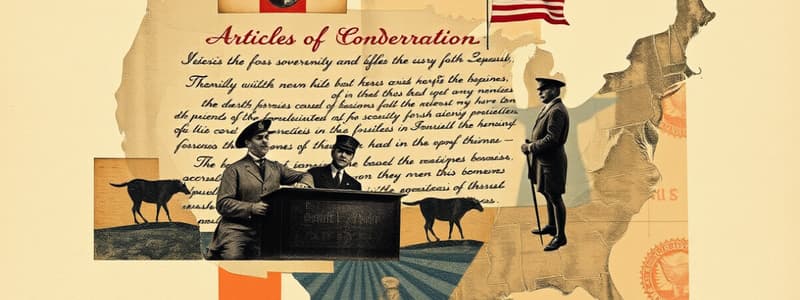Podcast
Questions and Answers
Which description best defines a confederation?
Which description best defines a confederation?
- A system in which states agree to form a national government, but maintain their sovereignty (correct)
- A system where power is divided equally among all states
- A government where the states are completely dependent on the national government
- A centralized government with no state powers
Which word best describes the central government that was created under the Articles of Confederation?
Which word best describes the central government that was created under the Articles of Confederation?
weak
What was a main reason for creating the Articles of Confederation?
What was a main reason for creating the Articles of Confederation?
To determine the power of states in the federal government
What was the national government's biggest concern if facing a war, under the Articles of Confederation?
What was the national government's biggest concern if facing a war, under the Articles of Confederation?
A sovereign group is one that is?
A sovereign group is one that is?
Why did colonists feel the Articles of Confederation were necessary even though the Declaration of Independence was already written?
Why did colonists feel the Articles of Confederation were necessary even though the Declaration of Independence was already written?
Which reason most closely illustrates why the national government was unable to maintain law and order under the Articles of Confederation?
Which reason most closely illustrates why the national government was unable to maintain law and order under the Articles of Confederation?
Under the Articles of Confederation, if Virginia had ______0,000 citizens and Delaware had 5,000 citizens, how many votes did each state have in the legislature?
Under the Articles of Confederation, if Virginia had ______0,000 citizens and Delaware had 5,000 citizens, how many votes did each state have in the legislature?
How many of the 13 states needed to approve a law before it could be passed under the Articles of Confederation?
How many of the 13 states needed to approve a law before it could be passed under the Articles of Confederation?
Under the Articles of Confederation, why didn't the national government enforce the laws?
Under the Articles of Confederation, why didn't the national government enforce the laws?
Which statement best represents an economic weakness of the national government under the Articles of Confederation?
Which statement best represents an economic weakness of the national government under the Articles of Confederation?
Which responsibilities were assigned to the central government under the Articles of Confederation?
Which responsibilities were assigned to the central government under the Articles of Confederation?
If the government under the Articles of Confederation was so ineffective, why were there no changes made to improve it?
If the government under the Articles of Confederation was so ineffective, why were there no changes made to improve it?
The fact that there was no national military was a weakness in which area of government?
The fact that there was no national military was a weakness in which area of government?
Flashcards are hidden until you start studying
Study Notes
Confederation and Sovereignty
- Confederation is a system where states create a national government while retaining their sovereignty.
- A sovereign group operates independently, possessing full control over its affairs.
Articles of Confederation
- The central government established under the Articles of Confederation was notably weak.
- A primary reason for creating the Articles was to clarify the balance of power between states and the federal government.
- The national government lacked a military, which raised concerns about defense in times of conflict.
Legal and Economic Weaknesses
- The absence of a national court system hindered the government's ability to maintain law and order.
- The national government faced significant economic weakness, highlighted by its inability to collect taxes.
Legislative Requirements
- States had disproportionate influence in the legislature, with both Virginia and Delaware receiving only one vote each, regardless of population.
- For a law to be passed, nine out of the thirteen states needed to approve it.
- The enforcement of national laws rested with the states, which limited the national government's power.
Ineffectiveness and Amendments
- Despite the government's ineffectiveness, amendments to improve the Articles were rarely made because all states had to consent to changes.
- Responsibilities assigned to the central government included the ability to draw up treaties, but enforcement remained a challenge.
Studying That Suits You
Use AI to generate personalized quizzes and flashcards to suit your learning preferences.




